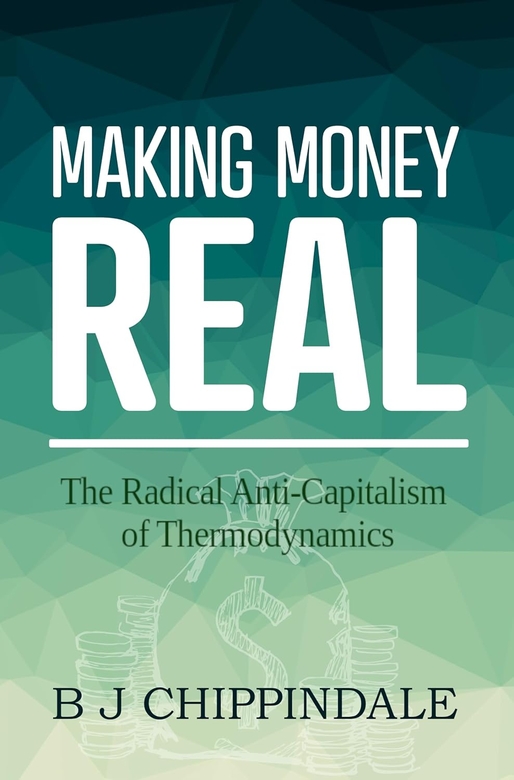
A mind-expanding thesis on the vital overlap of human nature and natural law, Making Money Real: The Radical Anti-Capitalism of Thermodynamics by BJ Chippindale deconstructs the concepts of currency, debt, ownership, and capital, presenting a compelling manifesto for a new generation.
In this radical and essential mixture of economics and natural science, Chippindale asks if the energetic exchange of atoms in the cosmos or food in our digestive system is all that different from the churn of currency through a society or community. Basing his cogent argument on the alignment of thermodynamic laws with the creation and perpetuation of money in our financial systems, he proposes a radical restructuring of this pervasive perspective to the ultimate benefit of all.
The core of this overarching theory is founded on the viewpoint of engineers – “real money represents work done” – which is incompatible with our current systems of currency, debt, and ownership. The idea of interest, for example, violates the law of conservation of energy, namely that it cannot be created or destroyed, merely transformed. Interest is not based in actual work done, yet it is summoned into existence and added to the larger system, which perpetuates the broken system.
Given the ever-growing and dynamic threats to societal stability, economic recessions, and systemic breakdowns loom large on the horizon, there is proven validity to these arguments, so while the book may feel far-flung or little more than a thought experiment, the author’s thesis is firmly grounded in well-supported parallels to the natural world, referential data, hard facts, and the physical laws governing every other aspect of our existence. Beyond the anecdotal links between economics and physics, the book enumerates the tangible and cognitive consequences of our relationship to money, as well as proposing a potential future beyond the petty chains of debt and self-induced oppression.
This is summed up in the idea of Mahinism, a state in which humanity abandons exponential growth until a time when we transcend static boundaries, recognizing that issues like a Universal Basic Income, debt forgiveness, and the prohibition of profit from ownership are essential for a free and thriving future. While ideas like this might seem like they come from one side of the partisan divide, the text remains strictly theoretical and unburdened by political ideology, so it can be appreciated by critical thinkers across any spectrum.
Despite the highest-level imagining required to properly internalize this book, the language is surprisingly accessible and the concepts are laid out intuitively, without the condescension of expertise or the imposition of any one belief system, which is especially important for such a radical thesis. Methodically moving through every aspect of society and belief touched by money, this relentlessly insightful read is both rhetorical and revolutionary, expanding from the importance of language to the restorative potential of a reimagined society to save a flailing world.
While the prose can be necessarily heady and abstractly philosophical, the academic and philosophical lenses Chippindale applies are mostly used to generalize, yet are still precisely informative. Consuming and comprehending this book can be both frustrating and enlightening in its prescriptions, but it will leave any open mind changed to new possibilities for our future.
Book Links
STAR RATING
Design
Content
Editing
Get an Editorial Review | Get Amazon Sales & Reviews | Get Edited | Get Beta Readers | Enter the SPR Book Awards | Other Marketing Services























Leave A Comment